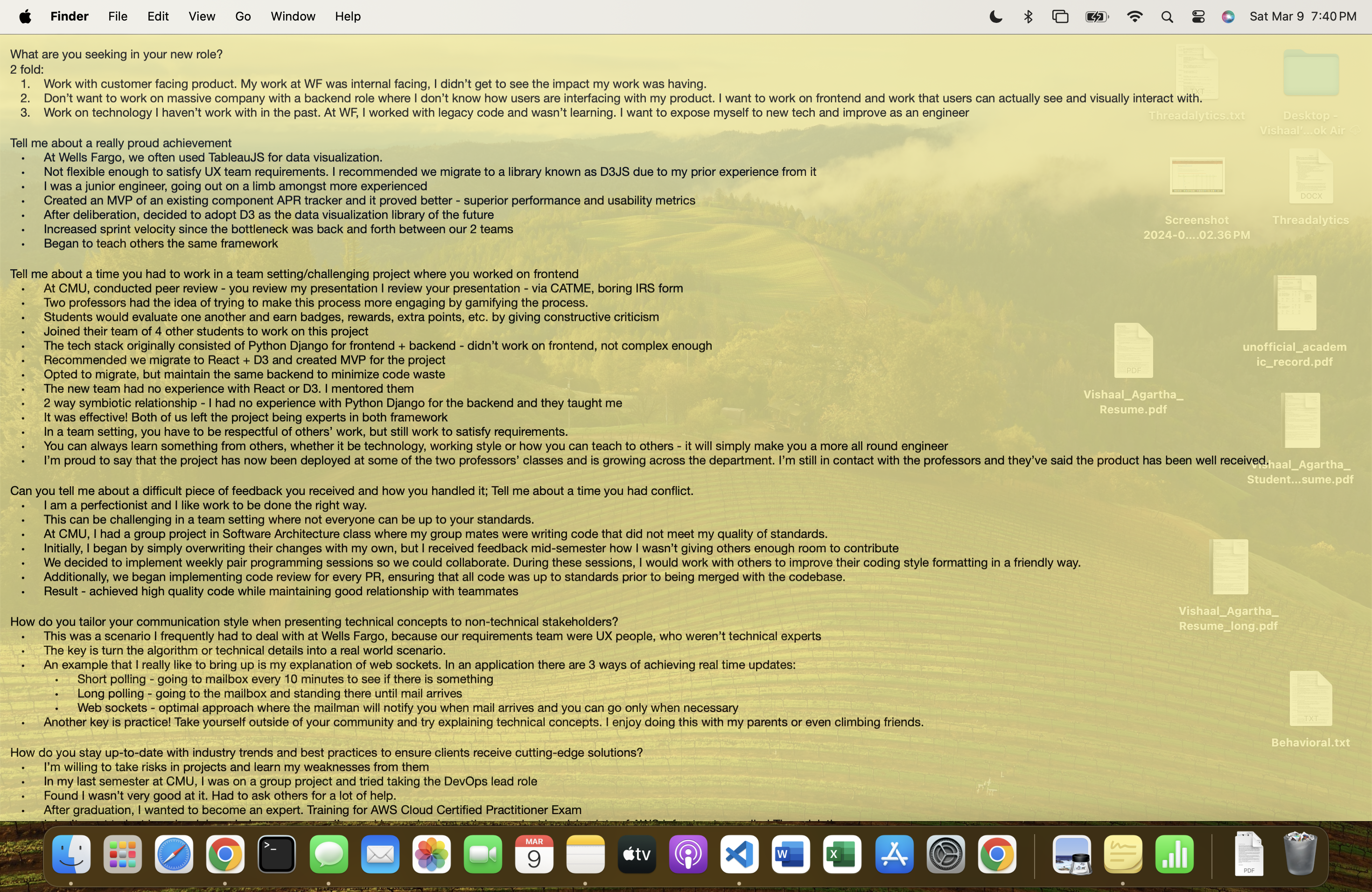Lessons from Behavioral Interviews
Published:
Behavioral interviews are tricky. They aren’t as straightforward as technical interviews and some people simply aren’t too good at them. The main differences are:
- There is no perfect and finished answer - it’s not like you can just memorize the perfect solution like a Leetcode algorithm problem and regurgitate it
- The answer depends on the interviewer - your interviewer should have a massive impact on how you phrase and formulate your answer
Let’s dive a little deeper into these.
Why is there no perfect and finished answer?
The answer to 2-sum is simple - sort and use two pointers or use a hashmap. But the answer to “What is a technical problem you solved recently?” should always be evolving and changing. Maybe you’ve encountered a more recent or complex problem that you want to discuss. Maybe your explanation could be improved. Maybe you didn’t even have a good solution to the problem.
Things can get even hairier for other questions like “What is your biggest weakness?”. What is a weakness that you are willing to admit that isn’t too self-deprecating, but something worth investigating? You don’t want to say: “I have an extremely dominating personality that can take over the group project” because that’s too damning. You also shouldn’t say, “I’m too much of a perfectionist” because that isn’t even a flaw really.
Why does the answer depend on the interviewer?
A key thing to do during a behavioral interview is to craft your answer to the interviewer. It’ll be more clear after a concrete example. An interview typically begins with the question: “Tell me a little about yourself”. I have 2 types of answers to this question. The first is a boilerplate explanation of my work experience, technical skills, and current projects. The second includes my hobbies such as rockclimbing or watching NBA basketball.
It’s imperative that I understand whether or not the interviewer wants to hear about my hobbies. I can’t say how many times I’ve gotten the response, “Wow! I’m a
Now that I’ve brought up more questions than answers, let’s actually talk about my recommendations:
1) Have an answer to everything. I mean everything.
You should have an answer to anything the interviewer asks. The worst is when the interviewer asks something and you have sit there like “uhhhh gimme a minute”. The blank silence can be awkward.
Note, I don’t mean that you need to have an answer to every question, but should have an answer to each template. What template? I’m glad you asked
2) Make a story-template box
This idea is from the book “Cracking the Coding Interview” by Gayle Laakman McDowell. You should make a table of the following format:
| Common Questions | Project 1 | Project 2 | Project 3 | … |
|---|---|---|---|---|
| Challenges | ||||
| Mistakes/Failures | ||||
| Technical Decisions | ||||
| Enjoyed | ||||
| Leadership | ||||
| Conflicts | ||||
| What You’d Do Differently |
Fill it out and find your 2 best answers to each row. Have these stories down pat and ensure you can format them into different questions.
For example, “Can you tell me about a difficult piece of feedback you received and how you handled it” and “Tell me about a time you had conflict in the workplace” can be the same story/answer with minor adjustments.
3) Investigate beforehand
Do some stalking on LinkedIn. What kind of person is your interviewer? Young? Old? Do they post often on LinkedIn? What do they post about? What’s something you can drop in the conversation that can make you stand out?
4) Write questions beforehand
This goes for not only behavioral, but all interviews. But it’s worth mentioning again. Come with carefully thought-out, unique questions that will make the interview memorable.
Once, I actually found a quote on the company website from the interviewer. I asked them about it in a polite way, asking whether they could elaborate. How many people would’ve gone to the website, looked for the interviewer’s name, and marked that quote? I thought, not many - so I went ahead and wrote it down and asked about it during the interview.
5) Practice, practice, practice
It isn’t enough to have stories. You should make your stories flow like a conversation. Add a joke here and there. Avoid polarizing vocabulary. Fine tune things so that your answers appear human and genuine, but are, in reality, fairly mechanical.
And practice speaking out loud. Say it as if you were in the interview so hear what sounds awkward or what portions are confusing. You don’t want to be stumbling over your own words mid-answer.
6) Air on the side of controversial over immemorable
Hot take. I’d rather be controversial and stick out in an interviewer’s mind rather than be immemorable. If there’s an answer that sounds edgy and an alternative that is tame, but boring, I’d opt for the one with a little spice. Once again, this goes with the caveats of having read the room, etc, but I’d rather be the one that sticks out rather than just another one on the interview stack.
Finally, I want to share a screenshot of my interview prep notes. Take a look and get and idea of what you should prepare. Take note that this document is around ~3 pages long in reality.

A picture of my notes for your pleasure
